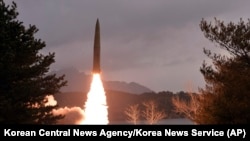North Korea launched an intercontinental ballistic missile Thursday, hours ahead of a major Japan-South Korea summit that will focus in large part on the threat posed by Pyongyang.
South Korea’s military said North Korea launched the ICBM from the Pyongyang area at about 7:10 a.m. local time. The missile landed about 69 minutes later outside of Japan’s exclusive economic zone, according to Japan’s defense ministry.
Japanese officials have not reported any damage from the missile, which landed about 250 kilometers west of Oshima Island in Hokkaido Prefecture, reported Japanese broadcaster NHK.
North Korea has not commented on the launch. It usually does not disclose details about its launches until the following morning in state media.
The launch highlights the challenges shared by Japan and South Korea, as the top leaders of both countries prepared to meet in Tokyo later Thursday.
South Korean President Yoon Seok Yeol’s visit to Japan, the first by a South Korean president in 12 years, is aimed at improving bilateral ties that have been hampered by historical disputes related to Japan’s 1910-45 occupation of South Korea.
Yoon and Japanese Prime Minister Fumio Kishida, who are expected to deliver remarks to the press after meeting Thursday, have said they would like a more forward-focused relationship that deals with common challenges, such as China and North Korea.
North Korea’s near-constant missile launches since early last year have served as a regular reminder of the threat posed by the nuclear-armed country.
In 2022, North Korea launched over 90 missiles – by far the most it has ever fired in a single year. Some of the missiles flew close to South Korea and Japan, prompting shelter warnings and air raid alerts.
North Korea has conducted three rounds of launches this week. On Tuesday, North Korea reported firing two medium-range ballistic missiles; on Monday, it claimed a successful launch of two strategic cruise missiles from a submarine.
The North Korean launches coincide with ongoing U.S.-South Korea military drills, which have been ramped up in response to North Korea’s increased weapons tests.
On Sunday, state media said North Korean leader Kim Jong Un promised a powerful response to U.S.-South Korean “war provocations,” which he said were nearing a “red line.”
U.S. and South Korean officials insist their military drills are defensive in nature and necessary in order to maintain military readiness.
North Korea also defends its launches as legitimate acts of deterrence and self-defense. However, North Korea is prohibited from conducting any ballistic missile activity under a series of United Nations Security Council resolutions.




